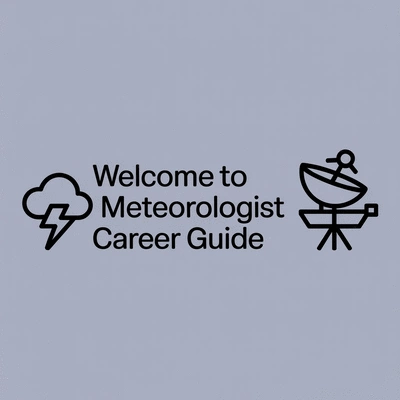What if your passion for understanding the sky could lead to a fulfilling career? The field of weather science not only empowers individuals but also equips communities to face climate challenges. As you embark on this journey, you'll discover a wealth of knowledge that can impact both your life and the world around you.
What You Will Learn
- The vital role of weather science in risk management and public safety, especially in extreme weather conditions.
- Career opportunities in meteorology and climatology, including research and community impact.
- The importance of integrating environmental science with weather studies for sustainable practices.
- Essential steps for preparing for a future in meteorology, including networking and gaining practical experience.
- Key factors to consider when choosing a weather science program that aligns with your career aspirations.
- Strategies for engaging with current students and alumni to gain insights into your educational path.
- Available resources for scholarships and financial aid to support your studies in meteorology.
Pathways to a Future in Meteorology and Climatology
This visual outlines key areas of focus and engagement for aspiring meteorologists and climatologists, from academic preparation to career advancement.
Academic & Skill Preparation
- ✓Identify Career Goals
- ✓Research Program Specializations
- ✓Seek Internships/Volunteer
- ✓Engage in Extracurriculars
Foundation for Success
Networking & Insights
- ✓Connect with Current Students
- ✓Leverage Alumni Testimonials
- ✓Build Alumni Networks
- ✓Engage Industry Experts
Guidance & Mentorship
Program & Enrollment Focus
- ✓Understand Course Duration
- ✓Review Learning Outcomes
- ✓Explore Scholarships
- ✓Connect Academic Advisors
Informed Decisions
Understanding Weather Science Education in Australia for 2025
As we navigate the complexities of our changing climate, the importance of weather science has never been more evident. Weather science encompasses the study of atmospheric processes, climate systems, and their interactions with the environment. This field not only helps us understand daily weather patterns but also equips us to tackle pressing issues like climate change and extreme weather events. It’s an exciting time to explore this discipline!
In Australia, aspiring meteorologists can benefit from comprehensive educational frameworks, such as the Graduate Meteorologist Program offered by the Bureau of Meteorology, designed to foster a deeper understanding of weather systems. So, what exactly is weather science, and why should you consider it?
Defining Weather Science and Its Importance
Weather science is the study of the atmosphere and the processes that govern weather phenomena. The insights gained from this field are critical for various applications, including agriculture, disaster management, and public safety. Understanding weather patterns allows us to predict extreme events, which is especially important in a country like Australia, known for its unique climate challenges.
- Risk Management: Meteorologists provide vital information to help communities prepare for severe weather.
- Resource Management: Insights into weather patterns inform agricultural practices and water resource allocation.
- Climate Research: Understanding long-term climate trends is essential for developing effective environmental policies.
In essence, weather science plays a vital role in ensuring the safety and well-being of communities while driving advancements in environmental stewardship.
Why Pursue a Career in Meteorology and Climatology?
Choosing a career in meteorology or climatology opens doors to a range of thrilling opportunities. Meteorologists not only forecast weather but also contribute to our understanding of climate dynamics and environmental change. This field is perfect for those who are passionate about science and eager to make a difference!
- Dynamic Work Environment: Every day offers new challenges as weather patterns shift.
- Impactful Contributions: Your work could help save lives and protect property from natural disasters.
- Research Opportunities: Engage with cutting-edge technology and scientific research to explore climate solutions.
If you’re someone who enjoys problem-solving and is interested in the natural world, pursuing a career in this field can be incredibly fulfilling.
Exploring the Role of Environmental Science in Weather Studies
Environmental science plays a crucial role in weather studies, linking the impacts of human activities with climatic changes. Understanding the interplay between the environment and weather systems enhances our ability to predict future scenarios and implement sustainable practices. For instance, programs like the Environmental Science program at ANU emphasize the integration of these disciplines.
- Climate Change Studies: Investigate how anthropogenic factors influence weather patterns.
- Ecological Impact Assessments: Assess how weather affects ecosystems and biodiversity.
- Policy Development: Utilize findings to inform policymakers about environmental conservation strategies.
By integrating environmental science with weather studies, we can create a more sustainable future and better prepare for the challenges ahead.
Quick Summary
Here's a brief recap of the key points discussed so far:
- Importance of Weather Science: Understanding atmospheric processes is crucial for addressing climate challenges and enhancing public safety.
- Career Opportunities: A career in meteorology offers dynamic work environments and impactful contributions to society.
- Educational Pathways: Aspiring meteorologists should consider program specializations, faculty expertise, and real-world experiences.
Frequently Asked Questions (FAQs)
What is weather science, and why is it important?
Weather science is the study of the atmosphere and the processes that govern weather phenomena. It is crucial for risk management, resource management, and climate research, helping communities prepare for severe weather and develop effective environmental policies.
What career opportunities are available in meteorology and climatology?
Careers in meteorology and climatology offer dynamic work environments, opportunities to make impactful contributions to public safety and property protection, and engagement in cutting-edge scientific research and technology.
How does environmental science relate to weather studies?
Environmental science is integral to weather studies by linking human activities to climatic changes. It enhances our ability to predict future scenarios, assess ecological impacts, and develop sustainable environmental conservation strategies.
What should I consider when choosing a weather science program?
When choosing a program, identify your career goals, research program specializations, evaluate faculty expertise, and look for practical opportunities like labs or fieldwork to ensure alignment with your aspirations.
How can engaging with current students and alumni help my educational path?
Connecting with current students and alumni provides valuable firsthand insights into program realities, faculty support, and career trajectories. These interactions can offer genuine perspectives that go beyond academic descriptions and aid in informed decision-making.
Are there resources for scholarships and financial aid for meteorology students?
Yes, prospective students can research scholarships specifically for meteorology or environmental science, investigate government financial aid programs, and consult with their chosen university's financial aid office for support.
Key Takeaways for Prospective Weather Science Students
As you consider pursuing a career in meteorology and climatology, taking a step back to evaluate your options is crucial. Choosing the right program can significantly influence your future career path in weather science. Here are some key factors to keep in mind:
- Identify your career goals: Are you interested in research, forecasting, or environmental policy?
- Research program specializations to ensure they align with your interests.
- Look at faculty expertise and available resources, such as labs or fieldwork opportunities.
Making a well-informed decision can set you on the right course toward a fulfilling career in this exciting field!
Preparing for a Future in Meteorology and Climatology
Getting ready for a career in weather science involves more than just coursework. Here are some essential steps you can take to ensure you’re prepared:
- Engage in extracurricular activities, such as weather clubs or science fairs.
- Seek internships or volunteer opportunities to gain real-world experience.
- Network with professionals in the field to gain insights and mentorship.
These preparations will give you a competitive edge and help you build a solid foundation for your future!
Understanding Course Duration and Learning Outcomes
Before enrolling in a program, it's vital to understand what to expect in terms of course duration and outcomes. Most meteorology degrees can take anywhere from three to four years to complete, depending on the level of study. Here’s what you should consider:
- Check the curriculum for core and elective courses that match your interests.
- Look for programs that include practical components, such as hands-on projects or field trips.
- Understand the assessments and how they contribute to your overall learning experience.
By knowing the structure of your chosen program, you will be better prepared for the journey ahead!
Engage with Current Students and Alumni
Connecting with current students and alumni can provide valuable perspectives on what to expect during your studies. Their insights can help you make informed decisions about your educational path. Here are some ways to engage:
Real Experiences from Weather Science Graduates
Listening to firsthand experiences from graduates can illuminate the realities of a weather science career. Consider these approaches:
- Attend alumni events or webinars hosted by your prospective university.
- Join online forums or social media groups focused on meteorology.
- Request informational interviews with alumni to ask specific questions about their experiences.
These interactions can offer you genuine insights that go beyond the classroom!
How to Leverage Testimonials for Informed Decisions
Testimonials and reviews can be incredibly useful in guiding your choice of program. Pay attention to the following:
- Look for consistent themes in feedback, such as faculty support or course rigor.
- Consider the job placement rates of graduates from each program.
- Evaluate how well the program aligns with your interests and career aspirations.
Utilizing these testimonials will help you make an informed decision that aligns with your goals!
Building Alumni Networks for Career Advancement
Establishing connections with alumni can be invaluable for your career. Here are some networking strategies:
- Participate in university-sponsored networking events.
- Utilize platforms like LinkedIn to connect with alumni in your desired field.
- Engage with alumni associations that focus on weather science and climatology.
Building these relationships can open doors and provide mentorship opportunities as you navigate your career!
Next Steps for Enrollment and Further Research
Once you’ve decided on a program, it’s time to take the next steps toward enrollment. Here are some actionable items:
Resources for Finding More Information on Courses
There are numerous resources available to help you gather information about courses. Consider exploring:
- The official university websites for detailed program descriptions.
- Educational forums and websites that compare different weather science programs.
- Open Days or virtual tours that allow you to experience the campus and meet faculty.
These resources will provide you with comprehensive information as you move forward!
Connecting with Academic Advisors and Industry Experts
Engaging with academic advisors can be incredibly beneficial in your educational journey. Here’s how to make the most of these connections:
- Schedule meetings to discuss your academic and career goals.
- Ask for recommendations on specific courses or programs that align with your interests.
- Seek out industry experts who might provide insights into the job market. For instance, the Climate Change in Australia initiative offers valuable learning support and training.
These connections can guide you toward making informed decisions!
Exploring Scholarships and Financial Aid Options
Financing your education is crucial, and exploring scholarships and financial aid can ease the burden. Consider these options:
- Research scholarships specifically for meteorology or environmental science students.
- Investigate government financial aid programs and grants.
- Check with your chosen university for financial aid resources and support.
Taking these steps will help you find the financial support you need for a successful academic journey!
Recap of Key Points
Here is a quick recap of the important points discussed in the article:
- Importance of Weather Science: Understanding atmospheric processes is critical for predicting weather patterns and addressing climate change.
- Career Opportunities: Meteorology offers dynamic work environments with impactful contributions to public safety and environmental stewardship.
- Environmental Science Integration: Combining environmental science with weather studies enhances our ability to implement sustainable practices.
- Key Considerations for Students: Evaluate your career goals, research program specializations, and seek hands-on experiences to prepare for a career in meteorology.
- Networking and Mentorship: Engage with alumni and current students to gain insights and build connections that can aid in your career advancement.








